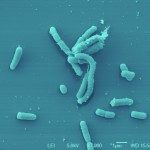Link to Pubmed [PMID] – 18667558
Link to DOI – 10.1099/mic.0.2008/017590-0
Microbiology (Reading) 2008 Aug; 154(Pt 8): 2251-2264
The Gram-positive intracellular pathogen Listeria monocytogenes is endowed with 17 sets of genes encoding two-component systems. L. monocytogenes is closely related to the Gram-positive model bacterium Bacillus subtilis, in which we have shown previously that the DegS/DegU system plays a central role in controlling stationary phase adaptive responses, including degradative enzyme synthesis and competence. Although an orthologue of the DegU response regulator is present in L. monocytogenes, the gene encoding the cognate DegS kinase is conspicuously absent. We have inactivated the degU gene of L. monocytogenes and shown that DegU negatively regulates its own synthesis. Direct binding of L. monocytogenes DegU to its own promoter region was shown in vitro by gel mobility shift and DNase I footprinting experiments. DegU was also shown to bind upstream from the motB operon, which also encodes the GmaR anti-repressor of flagellar synthesis. In contrast to the situation in B. subtilis, DegU was shown to be essential for flagellar synthesis and bacterial motility in L. monocytogenes and is cotranscribed with the yviA gene located downstream. We also show that DegU is required for growth at high temperatures, adherence to plastic surfaces and the formation of efficient biofilms by L. monocytogenes. DegU plays a role in virulence of L. monocytogenes as well: in a murine intravenous infection model, an 11-fold increase in LD(50) was observed for the degU mutant. Taken together, our results indicate that despite the lack of the DegS kinase, DegU is fully functional as an orphan response regulator, and plays a central role in controlling several crucial adaptive responses in L. monocytogenes.



